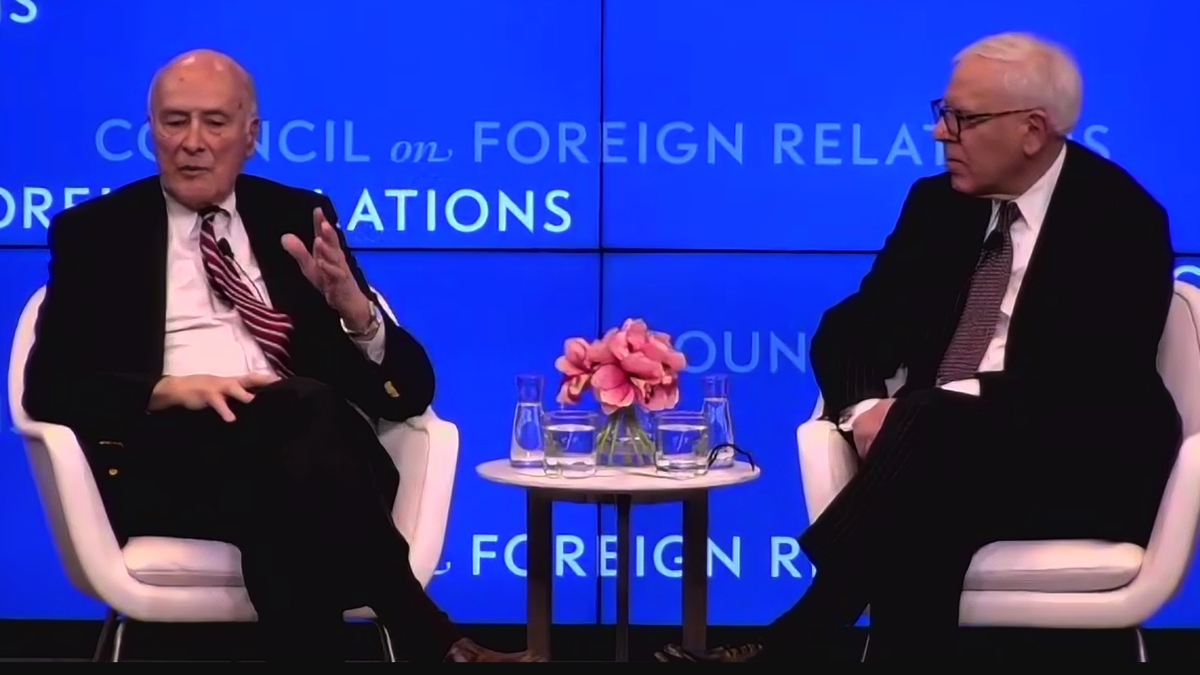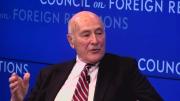During a wide-ranging discussion at the Council on Foreign Relations Tuesday evening, Joseph S. Nye spoke about the threats facing the country, the limits—and possibilities—of American power, and Harvard’s current “moment of crisis.”
Nye, the University Distinguished Service Professor emeritus and former dean of the Harvard Kennedy School (HKS), was speaking with former Harvard Corporation member David Rubenstein, who opened the conversation with a series of rapid-fire questions, sketching out the major life events—from childhood to academia to presidential administrations—described in Nye’s memoir, A Life in the American Century, published in January. As a deputy undersecretary in the State Department during the late 1970s, Nye was responsible for the Carter administration’s nuclear nonproliferation policy, working to limit the spread of nuclear weapons to nations around the world. Ten years later, Nye developed the theory of “soft power,” about the role of reputation, influence, culture, and moral suasion in international relations (as opposed to the “hard power” of military force). This conceptual framework, Rubenstein noted, “revolutionized the way a lot of people think about government.” During the Clinton administration, Nye served as assistant secretary of defense for international security affairs.

The evening’s most substantive and urgent questions, though, were firmly rooted in the present. One of the first audience members to raise his hand during the Q&A was Stephen Blank, Ph.D. ’67, who asked Nye for his thoughts about “what’s going on at Harvard at this moment of crisis.”
As he would again more than once during the evening, Nye invoked the upheavals of the 1960s, when Harvard’s campus was torn apart by the Vietnam War. At that time, “The outside influences that buffeted us were radicals who would tear everything down to destroy American imperialism,” he said. “Now, the outside influences buffeting us are billionaires who want more than their name on buildings—they want to micromanage the University. The danger I see is that we lose freedom of speech and independent analysis.” He added, “The fact that the Gaza war has been imported into American politics and into American universities…is very bad for the University.” He praised the recent panel discussions on the Israeli-Palestinian conflict organized by Tarek Masoud, Ford Foundation professor of democracy and governance. “He's been widely criticized for having some Palestinians who are radical,” Nye said. “But I attended a meeting two weeks ago that he had, which had Israelis, Palestinians, Saudis in the same room. And while they didn't agree with each other, they had what you could call a reasonable discourse. That's what a university should be about.”
Nye also defended former president Claudine Gay’s remarks to Congress last December, during a now-infamous hearing on antisemitism, as “technically, legally correct.” But Gay and the other university presidents “had been briefed by lawyers, and the people who were interrogating them were interested in political theater, not law.”
He added: “I think it’s going to take a while to dig out of this.”
(Later Tuesday evening, Interim President Alan M. Garber sent an email message to the Harvard community condemning what he called a “flagrantly antisemitic” cartoon that pro-Palestinian student and faculty groups had posted on their social media accounts over the weekend. The incident has reinflamed the controversy over antisemitism on campus; some groups involved in circulating the cartoon have since apologized. “Perpetuating vile and hateful antisemitic tropes, or otherwise engaging in inflammatory rhetoric or sharing images that demean people on the basis of their identity, is precisely the opposite of what this moment demands of us,” Garber wrote in his message. He added: “The members of the Corporation join me in unequivocally condemning the posting and sharing of the cartoon in question. The University will review the situation to better understand who was responsible for the posting and to determine what further steps are warranted.”)
Most of the evening’s other questions took on a more global reach. In response to a prompt from Rubenstein about the most worrisome geopolitical problem the United States faces today, Nye said, “I think we can manage the China challenge.…The problem that worries me in terms of geopolitics is what we’re doing to ourselves at home.” He called out the inaction in the House of Representatives on renewing support for Ukraine’s military (House Speaker Mike Johnson has declined to bring the measure up for a vote). “If you look at what Congress is doing now, destroying U.S. credibility on aid to Ukraine,” Nye said, “this is costing us a lot more than the $60 billion that are involved in the aid package.”
Later, Nye emphasized the critical importance of maintaining international alliances—from Europe to Asia to Australia—for strengthening the U.S. position with China and Russia: “If we can hold these alliances together, I think we're going to prevail in the long run.” But keeping alliances intact, he added darkly, requires credibility. Referencing Donald Trump’s recent controversial comments undercutting the commitment to protect NATO countries, Nye said, “Keeping our credibility means avoiding the kinds of comments that we've heard in American politics over the last couple of weeks, saying, ‘Let Putin do what he wants.’ That doesn't just hurt our credibility in Europe, it hurts our credibility in Asia.”
Audience members pulled at these same themes. Jane Harman, J.D. ’69, a former U.S. Representative from California, asked Nye about the recent rise in American isolationism. Isolationists who want an “inward-looking foreign policy” are not more numerous than before, Nye proposed, but they are now more mobilized: “This is a real problem.” Peter Goldmark ’62, a retired newspaper publisher who has led government agencies and philanthropic foundations in New York, asked both Nye and Rubenstein: “How do you talk to us about what is going on in our own country at this moment?…And what we can do to come out of it with strength and dignity?”
Nye advised people to “realize that, while we’re in a slough of despair right now, we’ve been here before. And then ask: how did we get out before?” Noting the unrest of the 1960s, he pointed to the resilience of American culture and institutions. “This problem is not totally new,” he said. “I don’t have the answer, but I think I have an approach.”
Rubenstein offered a more nuts-and-bolts answer: “I wish we could get money out of politics,” he said. “I think it’s been very destructive.”
In response to a question from Julliard COO Lesley Rosenthal ’86, J.D. ’89, about the power of American cultural arts to maintain soft power when foreign policy falters, Nye returned to his belief in the vibrancy of American cultural institutions. Recalling the worldwide protests during the 1960s against American policy in Vietnam, he said, “You had people marching in the streets throughout the world…but they weren't singing the communist ‘Internationale’ They were singing Martin Luther King’s ‘We Shall Overcome.’ So, an anthem that grew out of our civic culture essentially became part of our saving grace.”









